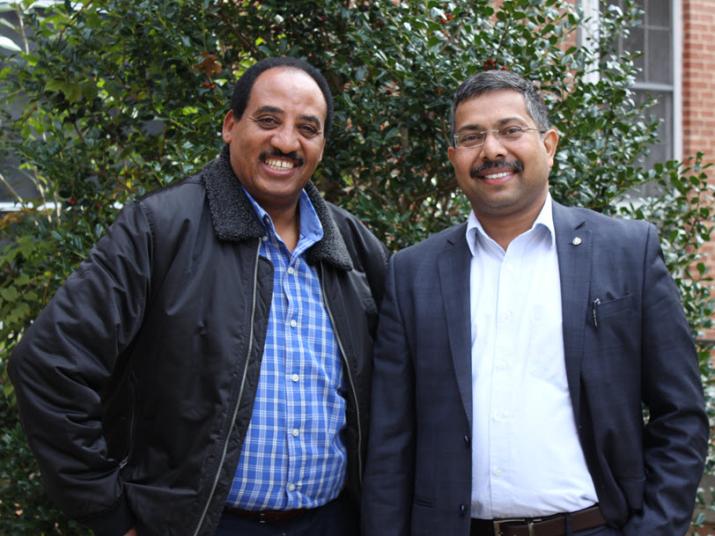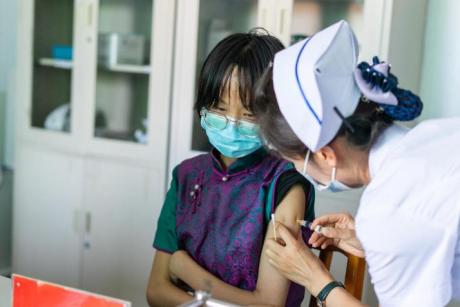
Center for Policy Impact in Global Health fellows, Addis Kassahun Mulat (left) and Daniel Victor.
Published December 18, 2017, last updated on June 3, 2020 under Research News
The Center for Policy Impact in Global Health (CPIGH), based in the Duke Global Health Institute (DGHI), is currently hosting two global health policy fellows, Addis Kassahun Mulat and Daniel Victor. During their fellowships, Mulat and Victor are conducting their own research studies, contributing to CPIGH research, participating in policy outreach activities and taking classes at Duke.
ABOUT CPIGH AND THE FELLOWSHIP PROGRAM
The Center for Policy Impact in Global Health is a policy lab that addresses critical challenges in financing and delivering global health in collaboration with the Duke Center for International Development and the Duke-Margolis Center for Health Policy. The Center also works with external partners, including other higher education institutions, NGOs, international financing institutions, and health and finance ministries and think tanks in Ethiopia and India.
The three- to five-month fellowship, funded through a small family foundation, is offered to early- or mid-career professionals from low- or middle-income countries, with priority given to applicants from CPIGH’s partner countries (Ethiopia and India). Fellows gain experience in policy analysis, quantitative and qualitative global health policy research, communicating the findings of the Center’s research with policy makers and writing policy briefs and scientific research papers.
The goal of the fellowship, says Gavin Yamey, CPIGH director and professor of global health and public policy, is to give the fellows time away from their regular jobs to acquire new skills, conduct new research and make professional connections that will ultimately help them build on the work they’re doing in their home country.
“But we’re also learning as much from Addis and Daniel as they’re learning from us,” said Yamey. “The Center has projects in partnership with state governments in India and the federal government in Ethiopia, and having fellows from these countries who have national expertise in addressing the countries’ health challenges is an enormous asset for us.”
MEET THE FELLOWS
Addis Kassahun Mulat
Addis Mulat, who hails from Addis Ababa, Ethiopia, has spent the past 25 years in different program and leadership roles in various public health organizations in Ethiopia and Tanzania, including the Global Fund to Fight AIDS, Tuberculosis and Malaria; the World Bank-funded regional capacity-building network for HIV prevention, care and treatment (ARCAN) project; UNAIDS; and USAID.
While pursuing his PhD in management through Bulacan State University of the Philippines, Mulat was working on a USAID-funded prevention of mother-to-child HIV transmission project. In 2011, he left this position to establish Kilimanjaro Consulting, a firm that provides technical assistance, operations and research support to public health organizations and private sector businesses.
The firm works primarily with organizations in Ethiopia, but Mulat’s vision is to expand its reach to other countries in Africa and Europe, as well as to the United States. Currently he oversees a small team of consultants. The firm has provided program evaluation and baseline studies for Care Ethiopia, Care Ethiopia/International, Save the Children, Johnson & Johnson and Seek Development Consultancy, to name just a few.
During his fellowship, Mulat is leading a research project at CPIGH that focuses on health financing in low- and middle-income countries. Specifically, he’s conducting a retrospective and prospective policy analysis of a pilot program in Ethiopia to implement community-based health insurance and social health insurance schemes with the goal of providing insurance coverage to 80 percent of the districts and 80 percent of the population by 2020.
“This research will help us identify some of the challenges and opportunities of the program and help policy makers figure out how to navigate the challenges and capitalize on the opportunities for nationwide scale-up of the schemes,” Mulat said.
Mulat’s primary motivation to pursue the fellowship was to continue building an international network to advance and broaden the work of his consulting firm. “Although it’s only a brief experience, I think the work I’m doing, the classes I’m taking and the people I’m meeting through this fellowship will help me realize my vision to transform Kilimanjaro Consulting into a more regional and global network,” he said, “and I’m grateful to the donor and the Duke Global Health Institute for these opportunities.”
Daniel Victor
With an undergraduate degree in fishery sciences and master’s degrees in fishery microbiology, Daniel Victor, who lives in Karnataka, India, may seem like an unlikely candidate for a global health policy fellow. But Victor believes that circulating in different professional spheres fosters fresh perspectives, and his path has ultimately led him to the health sector.
He began his career in biotechnology policy development for the government of Karnataka; after about six years, he transitioned to tax policy analysis in the finance department. Next up for Victor was the health sector, where he led the financing aspects of a national health program and assisted with a World Bank-funded health systems development and reforms project, followed by another stint in the finance department, this time managing Karnataka’s budget. Currently Victor is back in the health sector, serving as the financial adviser of Kidwai Memorial Institute of Oncology, the second largest cancer hospital in the country.
“The health sector is close to my heart,” he said. “I wanted to work at the cancer center because a few of my family members have had this terrible disease. That experience prompted me to think about the gaps in cancer care between people with resources and those without.”
As a CPIGH fellow, Victor is studying the implementation of the program he helped roll out in 2010: the National Program for Prevention and Control of Cancer, Diabetes, CVD and Stroke. Specifically, he’s looking at the challenges different stakeholders—policy makers, implementers and community partners—have faced and whether resources have been maximized and strategically aligned with the high burden of non-communicable disease in India.
Victor was drawn to the fellowship to sharpen his skills and gain some formal training in the health policy sector, but he also recognizes that his vast experience in the Indian government adds value to the Center’s work. “I can’t represent the entire country,” he said, “but I can offer unique perspectives and a nuanced understanding of India’s health sector based on my direct work experience in the system.”
Mulat and Victor will be working with Yamey at CPIGH through January.
Learn more about the Center for Policy Impact in Global Health and the Global Health Policy Fellows program.


